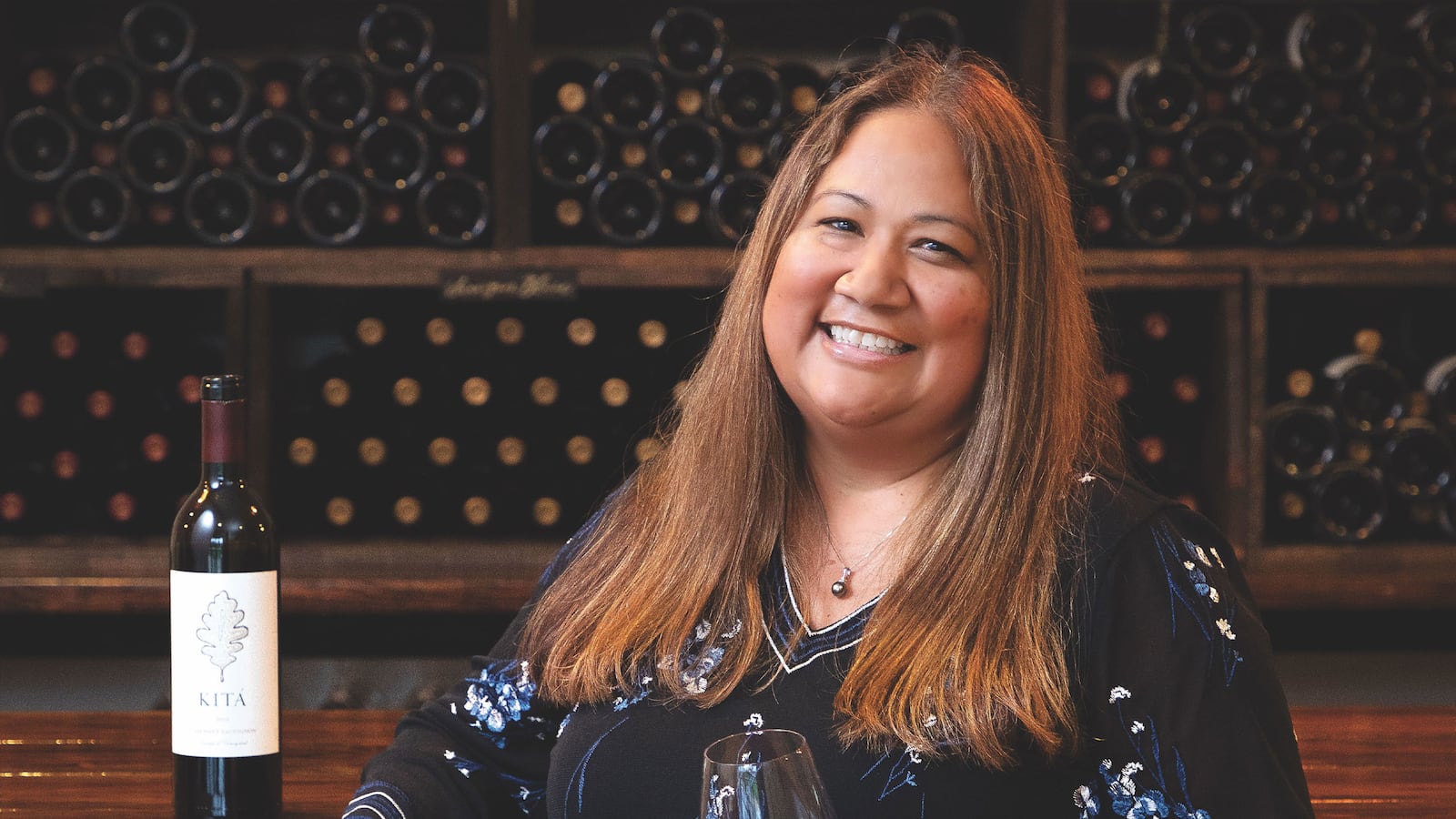For the last 15,000 years, members of the Chumash Indian tribe have lived in California on land they believed was given to them by the gods. Their original territory ran from Malibu to Monterey until settlers crammed them onto a sliver of property, a 127-acre reservation near Santa Barbara.
Today, the area is more well-known for its wines rather than the history of the Chumash people, but that might soon change.
Tara Gomez is a spirited woman with a vivacious chuckle that often peppers her sentences. Her father was a Chumash tribal elder and her mother is from the Pueblo tribe in Arizona. She is the only certified Native American winemaker in the country and produces wines with her tribe at their Camp 4 Vineyards.
In 2010, the Chumash bought a 1,400-acre plot known as Camp 4 for an undisclosed price to build housing for their growing tribe. It was purchased from late actor, vintner and hotelier Fess Parker, and included a 256-acre vineyard. The money to purchase the vineyard came from revenue built from the tribe’s Chumash Casino Resort, which has also helped enhance the lives of their tribal members and families by providing jobs, quality health care and excellent educational benefits. “I am a perfect example of this story,” Gomez explained to me. “With the financial support of my tribe, I was able to go off to college and get my degree in enology.”

The vines produce quality fruit and a number of brands, including Kunin and Railsback Frères, all buy fruit from Camp 4. The Chumash tribal elders realized that in addition to building housing on the land, they could operate a profitable grape-growing business.
That’s when Gomez asked the tribe to allow her to give back. The Chumash had already funded her education at California State University of Fresno. The tribe is one of the few sovereign nations in the world that finances higher education for all its interested members, placing strong belief in their youth. Gomez went on to become the enologist/lab manager at J. Lohr Vineyards & Wines and then spent two years high up in the Pyrenees mountains in Catalonia, learning traditional styles of winemaking. She later studied with winemakers throughout Spain, France and Germany. When her tribe purchased Camp 4, she realized she could spearhead the project, bring in revenue for her people and perhaps create a new narrative.
The wine brand they started, Kitá, which translates into “our valley oak” in the Chumash native language of Samala, had its first vintage in 2013. It’s only been a few years, but already Gomez has stacked up an impressive amount of points, medals and buzz around the project.
At the same time, Gomez and her tribe have had to face enormous challenges.
“It’s sacred land to us; it’s very meaningful,” she told me. “But unfortunately, yeah, we have to buy it back.” Even heavier is the pushback from the community. In 2019, a judge invalidated the decision to make Camp 4 part of the Chumash Reservation. Kenneth Kahn, tribal chairman for the Santa Ynez Band of Chumash Indians, said in a statement to a local TV station, “Camp 4 has always been historic tribal land, and the tribe will continue to fight to ensure adequate housing for its members.”
There were many obstacles along the nearly decade-long journey of placing Camp 4 into their land trust, including lawsuits filed by local opposition groups.
However, in a historic moment on December 17, 2019, the U.S. Senate voted to pass the National Defense Authorization Act, which included language directing the Department of Interior to take Camp 4 into federal trust for the Santa Ynez Band of Chumash Indians. On December 20, 2019, President Trump signed the bill.
As I drove around Camp 4 with Gomez, she pointed to swaths of empty land where wild buffalo roam and where the tribe hopes to build homes. “It’s still going to take a number of years before this land really feels like ours. Again.”
Gomez leaves the bureaucracy to the elders and focuses instead on the grapes. “We were always taught to respect the land growing up, to be in balance. I come out here before the pick in the morning and say my prayers every day. High up on that hill, I pray that everyone has a good harvest.” When we drive by a pile of sticky grape stems she remarks that growing grapes is a partnership with Mother Earth. “We created a compost program. Everything I take from the Earth is given back.”
With Kitá, the best wines are an homage to elements of this planet. T’aya, which means Abalone Shell in Samala, is a waxy and oily dream of Marsanne and Roussanne. Spe’y (meaning “flower”) is a cheerful blend of Grenache, Carignan, and Syrah, and Kalas (“breathe”) is a sleek homage to the right-bank in Bordeaux with Merlot and Cabernet Franc dominating.
Gomez also has a side project with her Catalan partner, Mireia Taribó. “We are a team of two winemakers, wife and wife.” As an homage to Taribó’s native language and where they met, the label is called Camins 2 Dreams (the path to our dreams). While Kitá is a reflection of her tribe’s land and story, Camins 2 Dreams is all her own. With Kita, she remarks “how many tribal members are there now? [I have] 120 bosses!” She’s not joking, all of the voting members of the tribe get a say on how the wine is made.

For her own project, the wines are much more sauvage—she only uses native yeast to ferment the wine. And she focuses on varieties that spoke to her during her travels, like Grüner Veltliner and Syrah. Gomez mentions that her favorite region is Côte-Rôtie and while tasting her leathery and gamey Syrah it’s evident that she is a true disciple of the Northern Rhône.
Gomez admits that she has faced criticism and has been constantly questioned. After “coming back from the Pyrenees, I knew you could pick a bit earlier and still have ripeness but people would always ask, ‘Are you sure?’ And yes! I was sure, and they realized I was right.”
There are few female winemakers working today, even fewer of color, and practically none that are openly gay.
When I asked Gomez if she had ever experienced inequality, she laughed, “Oh yeah! It’s kind of, like, everywhere. It’s tough in the wine industry, it is male-dominated. Even in college, I was only one of two women to graduate from the enology program. I’ve always faced [inequality] and dealt with it, which is why I don’t want to be like that. I’ve always felt that I am equal to you, we are all in this together, we are all on this team and we all come together to help each other.”
The wine world is dominated by male and white winemakers. However, the indigenous people of the land are, perhaps, more evolved. In many Native American tribes, women are seen as equals to men, and Chumash women could serve equally as chiefs and priests. Gomez echoes this, “the women are very powerful in the native community.”
David W. Machacek and Melissa M. Wilcox write in Sexuality and the World’s Religions “When Spanish explorer Juan Cabrillo first encountered the Chumash of the South Coast of California, he and his men were greeted warmly and hospitably—imagine their surprise at being welcomed by the sovereign leader of a powerful nation—a woman.”
Perhaps the last hurdle for Gomez and her tribe is the long outdated but unfortunately still present stereotype of the “drunk Indian.” The shameful collection of stigmas and myths surrounding alcoholism and Native Americans comes from the racist ideology that fueled colonialism.
To set the record straight, Native Americans aren’t genetically more susceptible to alcoholism. The issue of addiction in the indigenous community is a social one, not genetic. To combat addiction in their tribe, the Chumash are helping their youth through education and empowering them to become self-sustaining. The Camp 4 Vineyards are a crucial piece in this puzzle, providing jobs, revenue and a legacy for their people.
Gomez ignores the myths and reiterates how seriously her people take their sacred rituals. “At our Pow Wows, there is no alcohol allowed. Everything that involves prayer and spirituality is kept separate. We make sure that we are mindful.” When I asked her how the elders felt about becoming producers of alcohol, albeit in the form of wine, she insisted they didn’t see it that way. Instead, it is “another way to share our story of our Chumash tribe.”
Gomez’s story as this country’s first indigenous winemaker is evidence of how empowering one person in a community can lift up the whole village.

